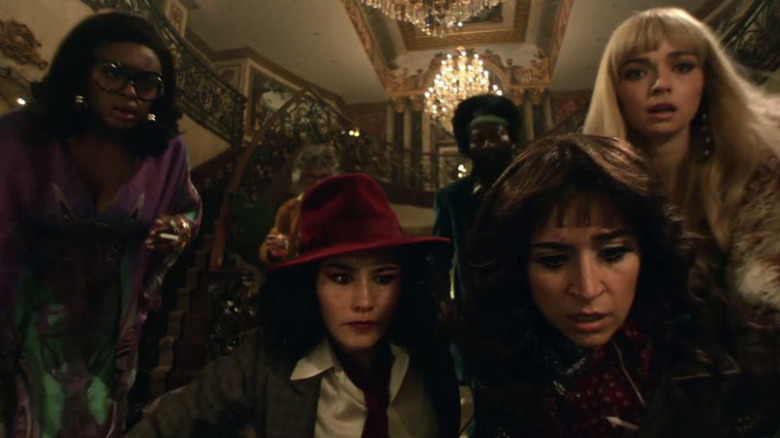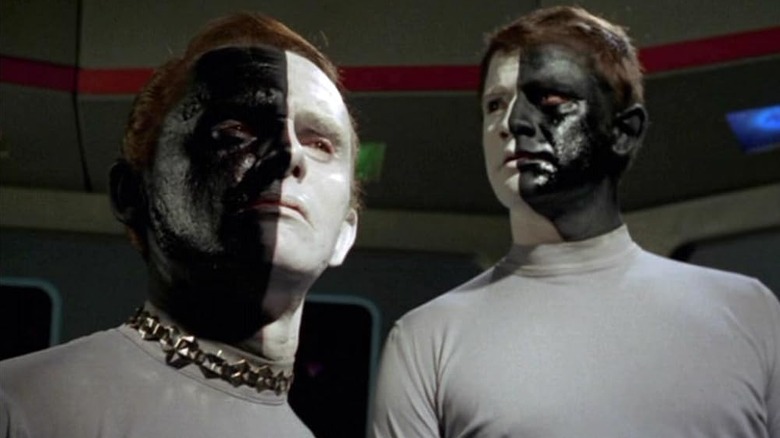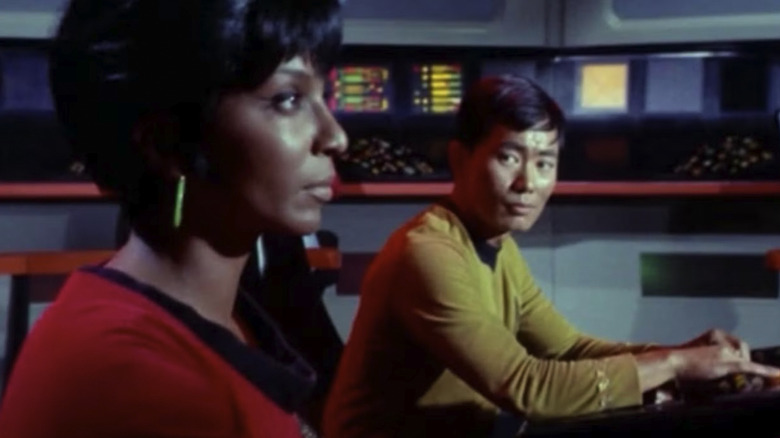This text comprises spoilers for “Star Trek: Unusual New Worlds” season 3, episode 4, “A House Journey Hour.”
“Star Trek: Unusual New Worlds” is about within the twenty third century, so clearly it might probably’t do a holodeck episode, proper? Fallacious!
“A House Journey Hour,” directed by franchise veteran Jonathan “Will Riker” Frakes, drops La’an Noonien-Singh (Christina Chong) right into a holodeck journey proper out of “The Subsequent Technology.” The set-up is that she’s testing a prototype of the holodeck and decides to behave in a narrative primarily based on her childhood favourite “Amelia Moon” detective novels. La’an casts herself as Amelia in a mid-Twentieth century Hollywood homicide thriller. Tony Hart, the studio head producing a soon-to-be-canceled sci-fi TV sequence, “The Final Frontier,” has been murdered. “Amelia” should discover who among the many solid and crew of the present (with avatars modeled after the Enterprise crew) is the killer.
If “The Final Frontier” seems to be acquainted, it ought to! The show-within-a-show is blatantly a stand-in for the unique “Star Trek” and the joke is just too apparent for it to whoosh over anybody’s head just like the hovering Enterprise. “A House Journey Hour” is an ouroboros: a “Star Trek” episode about “Star Trek.” One of many pivotal moments of the episode explores why “The Final Frontier,” however actually “Star Trek,” is extra than simply, effectively, an hour-long house journey sequence.
Celia Rose Gooding/Uhura performs Joanie Gloss, one of many suspects and a glamorous expertise agent repping the “Final Frontier” actors. Joanie first seems to be fairly cynical however it turns on the market’s an idealist beneath that. When questioned as a suspect, her doable motive is wanting the present to outlive. She did need that, however not simply because she’d revenue from her shoppers being on a success sequence. She explains:
“Canceling ‘The Final Frontier’ is the stupidest factor Tony has ever performed. Do you understand how uncommon a present like that is? [The creator] wished to offer audiences a digestible model of their very own world by way of the lens of fantasy. Social commentary with rubber masks and buried metaphors, you recognize, science-fiction … [The studio was] extra … cautious, did not wish to make waves. The cowards! [He] wished ‘Frontier’ to take our rotten world with its warts and injustices and provides audiences one thing higher.”
Star Trek blended the pulp and social consciousness of traditional science-fiction
“All of that with weekly house adventures?” La’an/Amelia asks, unconvinced. However Joanie continues:
“You do not discover the thought inspiring? You do not suppose some child out there may be going to see this present and spend the remainder of their life looking the celebrities? You do not suppose an individual can love a chunk of artwork or music or a narrative a lot that it heals them, reveals them components of themselves they’ve by no means even seen earlier than, offers them hope? A present like this might’ve gone on perpetually, given generations of followers a spot to really feel seen, to belong, one thing to consider in once more, irrespective of who they had been or the place they got here from. However you’ll be able to’t do any of that with no season 2!”
The phrases ring a bell in La’an, who’s actually dwelling out her childhood fantasies of being a detective like Amelia Moon. In the event you’re a Trekkie, you most likely felt the identical manner about these phrases, as a result of you recognize what present Joanie is absolutely speaking about: “Star Trek” itself.
The baseline premise that “Star Trek” creator Gene Roddenberry had for the present was a utopian future the place mankind left behind greed and social division. Within the Sixties, house journey was a logo of optimism in regards to the future (“Trek” led to 1969, the identical yr the U.S. landed on the moon), and “Star Trek” helped cement that a part of the last decade’s legacy. Certain, Starfleet could also be adventurers on the ultimate frontier, however they are not out to satisfy an imperialist manifest future. They’re earnest explorers in search of to broaden their (and our) horizons.
After all, “Star Trek” cannot be credited fully to Roddenberry. The present’s different writers took his premise and used it to discover well timed themes like racism (“Let That Be Your Final Battlefield”), the pointlessness of struggle (“A Style of Armageddon,” the first-ever Klingon episode “Errand of Mercy,” and so forth.), and extra.
Not like “The Final Frontier,” “Star Trek” did get a season 2 — and three — however no extra. Clearly the “Trek” journey did not finish there; we would not have “Unusual New Worlds” if “Star Trek” had light into obscurity. However in contrast to “Unusual New Worlds,” the unique five-year mission stays incomplete.
Uhura has all the time been the largest signal of Star Trek’s social influence
The speech in “A House Journey Hour” can really feel like, and type of is, “Star Trek” patting itself on its again. Nevertheless it’s earned it, as a result of every little thing Joanie/Uhura says in that scene is true. “Star Trek” was the start of recent fandom and its hallmarks; fanfiction, cosplay, delivery, and so forth. There’s even a fan-created “Star Trek” vacation. As Joanie explains, that fandom is extra significant than simply actually loving the present. Marginalized folks can discover group in sharing artwork they love, particularly traditionally progressive and accepting artwork like “Star Trek.” /Movie’s lead editor and Trekkie Jacob Corridor has written how “Star Trek” helped him come out of the closet.
Crucial meta-touch of the speech is that it is Uhura’s actor delivering it. The unique “Star Trek” put its cash the place its mouth was and depicted an built-in solid; the Japanese American George Takei as Mr. Sulu, Walter Koenig because the Russian Chekov, and so forth. Probably the most daring casting was the late Nichelle Nichols as Uhura, positioning a Black girl as a lieutenant. That was an enormous deal for a rustic that had simply outlawed segregation two years prior. Nichols herself usually retold how Dr. Martin Luther King Jr. himself inspired her to maintain enjoying Uhura when she was having doubts about engaged on “Star Trek.”
“I feel I mentioned one thing like, ‘Dr. King, I want I may very well be on the market marching with you.’ He mentioned, ‘No, no, no. No, you do not perceive … You might be marching. You might be reflecting what we’re preventing for.'”
It truly feels even extra significant that it isn’t the unique Uhura saying the phrases in “A House Journey Hour.” Celia Rose Gooding (who has shared how each Nichols and Zoe Saldaña as Uhura influenced her) resides proof of Uhura’s influence on the true world even with out delivering a speech about it.
“Star Trek: Unusual New Worlds” streams on Paramount+, with new episodes of season 3 releasing on Thursdays.




